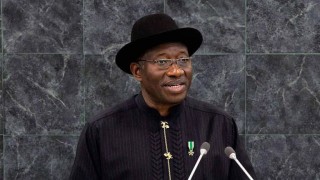While delivering a lecture at the National Institute for Security Studies (NISS) two weeks ago, former President Goodluck Jonathan warned against the misuse of religion in Nigeria, and prescribed how to ensure religious harmony, not division.

In his speech, Jonathan said that “We should… encourage volunteers from the major religions and different ideological bases, to work together towards uniting our people and bringing them to understand our religious and ideological differences. This is what obtains in other countries where adherents of different religions co-exist in an atmosphere devoid of bitterness, hate and acrimony. As a nation, we should realise that this is a fundamental problem before us. We must avoid these persistent religious crises and develop in a sustainable manner, like other countries that are multi-religious and prosperous.”
We certainly agree with the former president that the dubious mix of religion and politics is one of Nigeria’s fundamental problems and we commend his courage for drawing attention to this issue as political and electoral processes for the 2023 General Elections get underway. We must recall, however, that, as a politician, the former President was himself a major practitioner of this dubious political craft, and benefited considerably from it while in office.
As president, he was fond of making divisive comments on national issues from a church and thus created the impression that he was on the side of one half of the Nigerian community, rather than on the side of all. Christian religious leaders like the former president of the Christian Association of Nigeria (CAN), Pastor Ayo Oritsejafor had an unfettered reign making inflammatory comments and thus pitched the country’s religious communities against one another.
Nevertheless, we agree with the broad thrust of Jonathan’s speech. Religion, the sacred spiritual, social and cultural system that prescribes moral beliefs and ethics in human interactions, does not well with politics which is often concerned with factional scheming, intrigues, and manoeuvring to gain control of political power and status, and in the case of Nigeria, even illicit access to the commonwealth of the society. Though most politicians in Nigeria have religious affiliations, scholars have advocated a clear divorce between religion and politics, as the use of religion for power struggle has created wide division among the people and beclouded our sense of judgment in leadership recruitment and everyday social and political interactions.
Since the doors for the current political dispensation were flung opened in 1999, Nigeria has witnessed a dubious mix of religion and politics with very terrible consequences such as worsening corruption, poor human capital development, dysfunctional social system, poor management of the economy and social relations, and general insecurity and instability. For instance, former President Olusegun Obasanjo invoked a messianic disposition when, upon election in 1999, he claimed that God spoke to him to return to political power and correct the ills plaguing Nigeria. With his born-again aura, charismatic Christians, pastors and prophets found a home in Aso Rock Villa.
We must also not forget how many northern state governors, in the name of adopting the Shariah system in their states, tactlessly brought religion to the centre of politics and government at both regional and national levels in the early 2000s, which, unfortunately, exacerbated feelings of mutual suspicion between Nigeria’s religious communities, resulting in incidents of religious and associated communal conflicts, the saddest point of which was the religious carnage that followed the 2011 general elections.
But even as we trudge on since then, Christian and Muslim politicians and political leaders have continued to invoke religious rhetoric in their struggle and competition for power. The misleading idea has permeated the fabrics of the country’s polity, as the selection of political leaders and political appointments are viewed from a religious prism, rather than on the basis of competence or concern for the country and its peoples.
Religious politics has in no way accelerated economic development and social cohesion in Nigeria. Rather, Nigeria is made worse as the country is one of the most corrupt nations, where even COVID-19 intervention funds were stolen, according to Transparency International Corruption Perception Index in 2020. Despite wearing the garb of religion, politicians and public servants steal, lie, cheat, give and take bribes with impunity, regardless of their religious affiliations, as previous corruption scandals in Nigeria have shown.
Therefore, we support former president Jonathan’s call for a national campaign against mixing religion with politics, and urge the National Orientation Agency (NOA) to take this as a challenge, to impress it upon Nigerians that all religions emphasize probity, brotherliness, transparency, and accountability, in leaders and citizens alike. With properly designed message and dissemination strategy, it is possible to awaken the consciousness of Nigerians to the fact that the bane of our under-development is not in religion but in politicians and bureaucrats who have used our religions for mischievous ends.
And as we march towards the next elections, political parties must consciously warn candidates for elections on their platforms against the use of divisive religious rhetoric, symbols and imagery during campaigns. This could be reinforced if the Independent National Electoral Commission (INEC) includes campaigns based on religion as an electoral offence, just as hate speech is now an electoral offence. Religious leaders must also stop dabbling into politics, while the mainstream media should also desist from fueling religious sentiments on political matters. Above all, politicians and their parties must sell their programmes and agenda to the people without resorting to divisive religious strategies.
Source:- Daily Trust


Share your thoughts